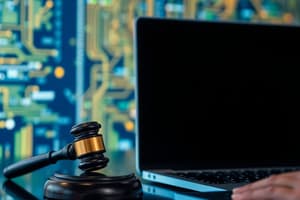Podcast
Questions and Answers
Which commandment emphasizes not using a computer to harm others?
Which commandment emphasizes not using a computer to harm others?
- Thou shalt prioritize profit over ethics
- Thou shalt use computers for entertainment purposes
- Thou shalt use computers for personal gain
- Thou shalt not use a computer to harm other people (correct)
What is prohibited regarding other people's computer files?
What is prohibited regarding other people's computer files?
- Sharing other people's files with permission
- Snooping around in other people's computer files (correct)
- Accessing public files without permission
- Using others' files for educational purposes
Which commandment addresses the use of proprietary software?
Which commandment addresses the use of proprietary software?
- Thou shalt not utilize proprietary software without paying (correct)
- Thou shalt only use free software
- Thou shalt not use proprietary software at all
- Thou shalt copy proprietary software for personal use
What does the commandment regarding intellectual output entail?
What does the commandment regarding intellectual output entail?
Which commandment requires considering social consequences?
Which commandment requires considering social consequences?
What is primarily governed by computer ethics?
What is primarily governed by computer ethics?
Which conference is recognized as one of the first focused on computing responsibility?
Which conference is recognized as one of the first focused on computing responsibility?
Who authored 'The Human Use of Human Beings' in 1968?
Who authored 'The Human Use of Human Beings' in 1968?
Which principle is NOT one of the Ten Commandments of Computer Ethics?
Which principle is NOT one of the Ten Commandments of Computer Ethics?
What foundational aspect of computer ethics addresses individual rights regarding personal data?
What foundational aspect of computer ethics addresses individual rights regarding personal data?
Which term refers to the ethical consideration of personal data collection and usage by organizations?
Which term refers to the ethical consideration of personal data collection and usage by organizations?
What does the principle of accuracy in computer ethics aim to ensure?
What does the principle of accuracy in computer ethics aim to ensure?
Which of the following is a concern regarding accessibility in computer ethics?
Which of the following is a concern regarding accessibility in computer ethics?
Flashcards are hidden until you start studying
Study Notes
Overview of Computer Ethics
- Computer Ethics (CE) or Information Ethics (IE) examines the ethical standards and moral codes governing information creation, organization, dissemination, and use.
- It addresses the relationship between technology and human conduct in society.
Historical Context
- The Software Ethics Conference was held in 1968, focusing on ethics related to computing, privacy, accuracy, and moral usage.
- Norbert Wiener’s book “The Human Use of Human Beings” (1968) highlighted the potential dehumanization due to automation technology without ethical guidelines.
- Walter Maner published "Starter Kit on Teaching Computer Ethics" in 1978, advocating for the incorporation of computer ethics into college curricula, which helped legitimize the discipline.
Key Areas of Ethical Concern
- Computer Crime: Issues include theft and hacking.
- Responsibility for Failures: Emphasizes the importance of quality assurance in technology.
- Protection of Assets: Involves security for records, software, and digital property.
- Privacy: Concerns individuals' rights to privacy in the digital realm.
Foundations of Computer Ethics
- Privacy: Questions the ethical means of collecting, storing, and sharing personal data.
- Accuracy: Addresses the need for truthful and accurate information in digital formats.
- Property: Explores ownership rights over digital files and online material.
- Accessibility: Debates whether equal access to technology and the internet is a human right.
The Ten Commandments of Computer Ethics
- Prohibits using computers to cause harm to individuals.
- Bans interference with others’ computer work.
- Outlaws unauthorized access to others' computer files.
- Forbids stealing through computer means.
- Denounces bearing false witness using computers.
- Prohibits copying or using proprietary software without permission.
- Bans unauthorized use of others’ computer resources.
- Forbids appropriation of others' intellectual output.
- Encourages consideration of social consequences of software and system designs.
- Promotes respectful and considerate use of computers among individuals.
Studying That Suits You
Use AI to generate personalized quizzes and flashcards to suit your learning preferences.




